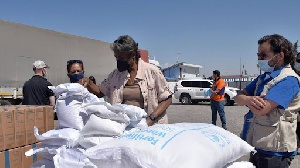- Home - News
- Elections 2024
- News Archive
- Crime & Punishment
- Politics
- Regional
- Editorial
- Health
- Ghanaians Abroad
- Tabloid
- Africa
- Religion
- Photo Archives
- Press Release
General News of Thursday, 24 April 2025
Source: www.ghanawebbers.com
Bridging Linguistic Divides in Humanitarian Aid: Role of Arabic and Somali Translation
Quick Assistance in Emergencies
People need help fast during emergencies. In wars, floods, and famines, every second counts. If victims speak one language and rescuers another, delays happen. This can put lives at risk.
In the Middle East and parts of Africa, Arabic and Somali are common languages. However, many aid workers speak English or French. This language gap creates serious problems. Arabic translation services are crucial for sharing safety plans and health information.
Understanding Local Voices
Every village or city has its own way of speaking. Even within the same language, dialects vary greatly. For example, Somalis in Hargeisa may sound different from those in Mogadishu. Similarly, Arabic differs between Jordan and Sudan.
People trust those who speak their language. In emergencies, they feel scared and confused by unfamiliar words. If aid messages come in a strange language, they may ignore them.
Helping people starts with understanding their speech patterns and tone. Some words can seem rude if not used carefully. Skilled translators ensure messages are kind and clear.
Why Written Translations Save Lives
Oral translations are helpful but written materials often play a bigger role in emergencies. Signs, flyers, posters, and text messages provide life-saving information.
For instance:
- A flyer shows where to find clean water.
- A poster explains how to prevent disease spread.
- A form helps someone register for food aid.
If these materials aren’t in Arabic or Somali, many won’t read them. When translated properly, people follow rules more easily and aid moves faster.
Medical Messages Need Clear Words
Health issues spread quickly in refugee camps and disaster zones. Doctors give instructions that must be understood to be effective.
Skilled translators convert complex medical terms into simple local words. Families can better treat a child’s cough or a woman’s fever when they understand what to do.
In Somalia, many trust local healers over hospitals. Careful translations can guide families toward safer choices.
Helping Women and Children Understand
In some areas, women and children use less formal versions of their languages or only their mother tongue. When aid teams use English exclusively, women miss vital information on baby care or shelter rules.
This is why English to Somali translation services are essential. They ensure mothers and grandmothers receive important safety information too.
Even small changes like using pictures on health posters make a big difference for understanding.
Schools in Crisis Zones: Speaking the Right Language
War or floods often close schools; kids miss lessons as a result. Aid groups try to help by setting up temporary schools but need proper learning materials.
Somali children learn best with Somali books while Arabic children need theirs too. Teachers also require guides in their own languages for effective teaching.
Translation brings comfort to children during tough times; school becomes a safe space for learning again.
Trust in Translators During Conflict
Fear spreads quickly in war zones; people become distrustful of strangers but listen to familiar voices.
Translators play an important role here; they build bridges between communities and aid teams without just changing words.
In places like Syria or Somalia, trusted translators connect families with safety messages that calm fears about conflict situations.
Giving a Voice to the Voiceless
In refugee camps, people must fill out forms for assistance like food cards or shelter requests. If these forms are only available in English while they speak Arabic or Somali, they cannot complete them effectively—leading to no food or medicine access.
When translators rewrite these forms into local languages everyone gets a chance at help regardless of reading skills.
This is where translation becomes action—it gives voice to those who might otherwise remain unheard.
Cultural Clarity in Translated Messages
Words can be tricky; even translated ones may carry unintended meanings without cultural context.
For example: Telling a Somali mother to “see a mental health doctor” might sound alarming while saying “speak about stress” feels caring.
The right choice of words maintains respect while avoiding shame—showing love instead.
A good translator knows how to convey difficult concepts gently; working with native speakers ensures this understanding goes beyond grammar alone.
Translators Are Not Just Helpers; They Are Heroes
In disaster zones, translators work actively alongside responders—they talk with doctors and assist food deliveries amid chaos.
They carry vital messages that provide clarity during crises—often being the first kind voice heard after loss.
That voice leads individuals toward food shelters or safety—a lifeline when needed most.
Planning Ahead with Language in Mind
Emergency teams now prioritize translation from day one—they avoid confusion by starting with appropriate tools such as:
- Choosing trusted local translators.
- Writing simple messages for broad comprehension.
- Testing communications before widespread distribution.
- Training locals on message dissemination techniques.
These steps streamline aid delivery ensuring more lives are reached effectively.
Conclusion
Language shapes feelings thoughts actions—it determines how quickly help arrives during humanitarian efforts.
Arabic/Somali speakers living through crises deserve clear communication tailored specifically for them.
Translation isn’t merely optional—it’s essential rescue work.
Each correctly shared message spreads hope each time children hear support spoken fluently fear diminishes.
During challenging moments accurate wording matters immensely—and when done right it heals guides saves lives!











